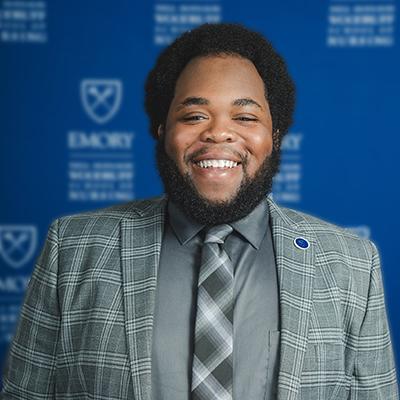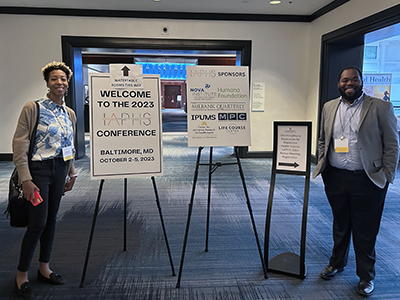
Few stories exemplify the transformative power of mentorship and opportunity as clearly as that of John Fuller, MS. A member of the 2023 Building Research Inclusion & Diversity in Graduate Education (BRIDGE) cohort at Duke's Department of Population Health Sciences (DPHS), Fuller's journey—from first-generation college student to emerging leader in health equity research—demonstrates the profound impact of programs designed to build diversity in education.
Originally from Akron, Ohio, Fuller credits Akron Public School’s Akron Early College High School for enabling him to graduate high school with an associate's degree. Through an Introduction to Nursing course and volunteer work at a local cancer center, he discovered his passion for nursing, gaining an appreciation for the balance between medical science and compassionate care.
"There was a time when I did not want to be a nurse because hardly any of the nurses I met looked like me," Fuller said. "I have firsthand experience with how the healthcare system can mistreat my communities -- Black and Brown LGBTQ+ people. Medical mistrust is earned. I eventually recognized this as even more reason to pursue nursing."
Despite facing significant personal challenges, including housing insecurity during his early undergraduate years and his father's battle with pancreatic cancer, Fuller persevered. Acting as an advocate for his family, Fuller developed a passion for health communication and literacy, health disparities, and cancer health equity. He applied to nursing school but was not accepted. Instead, Fuller chose to pursue his bachelor's degree in human development and family science at Ohio State University (OSU).
In 2021, Fuller was selected for the Cancer Research Experience for the Advancement and Training of Emerging Scientists Fellowship at the James Comprehensive Cancer Center, where he conducted research on chest/breast healthcare delivery for sexual and gender-diverse populations. His work contributed to a National Cancer Institute-funded grant studying sexual orientation and gender identity (SOGI) data collection. The following summer, he expanded his research experience through concurrent fellowships at Northwestern University and the OSU Center for Cancer Health Equity.
While an OSUCCC-James Pelotonia Fellow, he investigated how social isolation during the COVID-19 pandemic affected cancer screening among diverse populations and has published in this area.
Fuller graduated from OSU in 2023 magna cum laude with an honors research distinction, and was accepted to the BRIDGE program, marking a crucial steppingstone in his academic journey. Working under the mentorship of DPHS professor Leah Zullig, PhD, he contributed to an exploratory review of university-based implementation science programs while gaining valuable experience in systematic research methodologies.

"As a BRIDGE scholar, I had the chance to connect with experts across institutions and disciplines, particularly in the fields of implementation and dissemination science," Fuller explains. "Implementation science offered me a framework to apply my work on social determinants of health to interventions that could create tangible impacts. Collaborating with experts in this field has provided me with new tools to design, implement, and evaluate culturally affirming health interventions aimed at improving outcomes for Black LGBTQ+ populations."
During the DPHS Summer Institute (tuition-free for accepted BRIDGE scholars), Fuller attended grant and academic writing workshops that enhanced his research and writing skills.
Fuller's research portfolio expanded significantly following his BRIDGE experience. He secured prestigious appointments, including a National Institute of Nursing Research Diversity Supplement Award, a Robert Wood Johnson Foundation Health Policy Research Scholars Program Award, and fellowships with AcademyHealth and NAESM, Inc.
Drawing from his experiences as a researcher and fellowship recipient across multiple institutions, Fuller has cultivated a transformative vision for health equity, which centers on holistic well-being and not merely the absence of illness. This includes dismantling systems of oppression such as racism, homophobia, and stigma, which disproportionately affect marginalized communities. By fostering radically inclusive environments and promoting social cohesion, Fuller believes we can create spaces where everyone feels valued, celebrated, and supported in their health and well-being.
Fuller believes it is necessary to purposefully advance the collection of SOGI data within health systems to achieve this aim. Without accurate insights, he believes healthcare providers and policymakers may overlook the specific health concerns of multiple populations, failing to allocate resources effectively.
As he continues his trajectory toward becoming an independently funded researcher and expert in cancer health equity, Fuller remains deeply engaged in undergraduate teaching, student advocacy, and mentoring. He is currently a PhD candidate in Emory University’s nursing program and on-course to graduate in 2027. As a George W. Woodruff Fellow, he investigates how social support and stigma affect cancer screening and prevention among diverse populations.
At Emory, Fuller serves in leadership roles within the PhD Nursing Student Association and Black Nursing Student Organization, as well as the Student Advisory Committee at the National LGBT Cancer Network. Fuller’s story stands as a testament to the BRIDGE program's mission of fostering diverse leadership in population health sciences.
"Network intentionally," he advises future BRIDGE scholars. "Embrace personal and professional growth while remaining open to interdisciplinary collaboration. This program brings together scholars from a variety of fields, which is one of its greatest strengths."